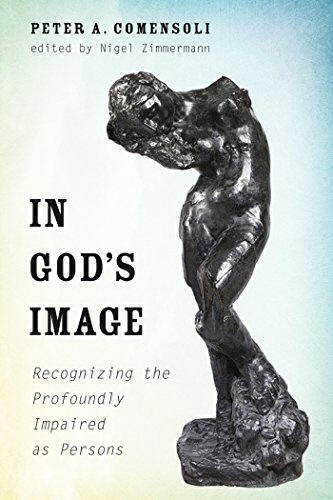Catholic Medical Quarterly Volume 69(4) November 2019
Book Review
In God's Image. Recognizing the Profoundly Impaired as Persons
by
Peter A. Comensoli. (Published by Cascade
Books)
Reviewed by Dr Pravin Thevasathan
 The author
is now the Catholic Archbishop of Melbourne. He deserves both our thanks
for this really uplifting work and our prayers.
The author
is now the Catholic Archbishop of Melbourne. He deserves both our thanks
for this really uplifting work and our prayers.
How ought we approach the disabled? For the Protestant theologian and philosopher Hans Reinders, people with profound disabilities ought to be treated with respect inspite of their disability. Reinders has been of great help to me over the years but I am inclined towards the author's opinion that he does not go far enough. For Comensoli, the disabled ought to be respected and their disability, far from diminishing their dignity, ought to be seen as a vital part of who they are, their personhood. We live out our humanity by being who we are. Our relationship with others does not depend on whether or not we are accepted in friendship. Friendship presupposes personhood. How very different this is to the view of Peter Singer who only grants personhood to those who are in a relationship with another being.
Our humanity is measured in the very act of living our lives. Perhaps most famously in our time, it was Jean Vanier who showed us that even the most profoundly disabled can form relationships and can be loved in their disabilities. Respecting persons in their diversity is a current trend. Why is this so difficult when it comes to respecting the profoundly disabled? The people of Iceland are apparently among the happiest people in the world. But they are not so happy to see the disabled.
Comensoli brilliantly compares the self-emptying of the disabled with the "kenosis" of Christ. The disabled are less likely to sully the image of God in their souls. It is the more able who are going to do this by pride and selfishness.
Personhood is not some kind of test that we have to achieve. It is intrinsic to being human. Human beings are persons because they are made in the image of God. Once we recognize dependence as something we all share in as dependent persons, we are less likely to discriminate against the disabled.
This is an authentically Catholic work, an inspiring read
